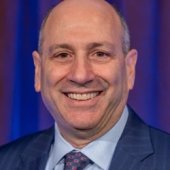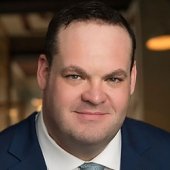Wealth management in a digital future with Greg Dillon of OneTeam Financial
IN BRIEF
- "I don’t think that the digitization of the monetary system really changes the game for wealth managers, but I do think that the U.S. is behind a lot of countries as far as payments go and the digital payment systems."
- "Given the fact that [crypto is] not as traceable as bank deposits, it does open itself up for these illicit transactions and things that are outside of the scope of what we really want crypto to be doing as a means of exchange."
- "Am I worried about the U.S. as a reserve currency? A little bit, but probably not for the reasons that you were thinking in terms of the digital currency."
In this VISION by Protiviti interview, Joe Kornik, Editor-in-Chief of VISION by Protiviti, sits down with Greg Dillon, founding partner and principal of OneTeam Financial. Dillon, Head of Wealth Management and Retirement Income Planning and leader the wealth management division, talks about the financial future, wealth management and AI, as well as the future of the dollar and the U.S. debt.
In this interview:
0:55 - Risks in wealth management
2:24 - The role of AI
5:50 - Digital payments and crypto
8:32 - Concerns about the U.S. dollar
Wealth management in a digital future with Greg Dillon of OneTeam Financial
Joe Kornik: Welcome to the VISION by Protiviti interview. I’m Joe Kornik, Editor-in-Chief of VISION by Protiviti, our global content resource examining big themes that will impact the C-Suite and executive boardrooms worldwide. Today, we’re exploring the future of money, and I’m joined by Greg Dillon, founding partner and principal of New Jersey-based OneTeam Financial. Greg is Managing Partner and Head of Wealth Management and Retirement Income Planning and leads the Wealth Management division. Greg, thank you so much for joining me today.
Greg Dillon: Hey, Joe. Happy to be here and I’m grateful for the opportunity.
Joe Kornik: Hey, Greg. You spend a lot of time thinking about risks and the financial future, obviously. What risks are you most concerned about these days?
Greg Dillon: One that’s top of mind these days is the threat of misinformation. It’s shocking how many folks get their news from social media and other sources. I think one of the impacts that we’ve seen as it relates to artificial intelligence is—whether it’s deep fakes or folks mimicking another person’s voice—I mean, there is a real threat of misinformation, and at the state that we’re in these days, that misinformation can spread very quickly and can have an immediate impact on the market. So, whether that’s some type of flash crash or something more dire, that’s one of the things that I do worry about. As it relates to our business and folks’ finances, the other thing that I worry about from a risk perspective is really longevity risk. It’s fantastic news that with all the advances in healthcare these days, folks are living much longer than they have in the past. However, it’s also sort of a double-edged sword because if you live a long retirement or if you live well into your 80s and 90s, then longevity risk is not just a risk in and of itself, but it’s a risk multiplier.
Joe Kornik: Greg, you mentioned AI in your answer and it seems we can’t have any discussion today that doesn’t involve AI’s impact, or any industry that doesn’t involve AI’s impact. How do you see AI changing the financial services industry in the future? Will it replace wealth managers eventually?
Greg Dillon: So, I think that’s an interesting question. There have been a lot of changes to the wealth management industry over the years, and I think artificial intelligence will continue to commoditize the asset allocation piece, but the best financial advisors that I know, the best wealth managers, are truly invested in their client’s success. They’re doing a lot more than picking stocks and bonds, right? Many folks called for the death of financial advice when robo-advisors came around. Robo-advisors do have a place in the market, right? They create diversified portfolios. When I say that, that part of the business has become commoditized. We see the advisory fees have really not compressed overtime. However, advisors need to step up their game and add a lot more value.
Joe Kornik: Right. It seems like AI’s impact and the digitization of the monetary system, there’s a lot of things happening in the marketplace that are going to radically alter it, I would think, over the next decade and beyond. So, since we’re talking about the future and you’ve already sort of taken us out a little bit about and to talk about AI’s impact, I’m just wondering when you do look out a decade or more, let’s say to 2035 even, what do you see for the space? Do you have any bold predictions about where this is ultimately heading?
Greg Dillon: I mean, when I when I look into the future, I think one of the things—and this might be a little bit of an oddball answer—but I think one of the things that is underappreciated is the potential impact that some of these weight loss drugs can have on our economy. Now, full disclosure, I don’t own the stocks of any of the companies that produce these drugs, but if you think about it, one of the biggest comorbidities outside of smoking is heart disease and other things, diabetes, that are directly related in some form or another to obesity. Really, it’s a big challenge in this country. Whether you’re talking about the food industry, the fitness industry, the airline industry, if these drugs are really the wonder drugs that folks are saying that they are, this could have an impact on a variety of different industries across the spectrum.
Joe Kornik: Very interesting. I mentioned, Greg, that we’re in the midst of this revolution, that’s just sort of beginning, I think, and will only accelerate over time. Physical cash most likely is going to be going away eventually. Digital currencies, I think, will eventually become the norm. New technologies are transforming the financial space. So, all of this is to say we’re at the precipice of a massive transformation of the monetary system. I’m curious, when you sit back and look at that and see how that transformation is taking place, what does that mean ultimately for wealth management?
Greg Dillon: I mean, at the end of the day, I don’t think that the digitization of the monetary system really changes the game for wealth managers, but I do think that the U.S. is behind a lot of countries as far as payments go and the digital payment systems. I think we’ve seen a pickup in Venmo, Zelle, and some of these other solutions that make the money transfer instantly, which is a fairly new phenomenon in this country, but in other countries, they are light-years ahead of us when it comes to that.
Really, the crypto piece of the question, I think cryptos going through some growing pains. I think whether you talk about physical cash or you talk about crypto, one of the challenges that always comes up is the illicit use of those funds, right? When we first heard of the breakout of war in Israel, it’s been public that some of that war was funded through cryptocurrency, and it does have some very positive characteristics. One of those is that it’s not specifically tied to the banking system. But given the fact that it’s not as traceable as bank deposits, it does open itself up for these illicit transactions and things that are outside of the scope of what we really want crypto to be doing as a means of exchange.
I still don’t think that we’ve seen—I think we’re getting there, but I think we need to see stability, because if we’re talking about a means of exchange, the last thing that you want to see in your currency, whether it’s a hard currency or a digital currency, is dramatic fluctuations in the price. I don’t want to go to the car dealership and pay crypto for my car, and then I find out 10 minutes later that had I waited an hour and a half, it would have cost me the equivalent of $5,000.00 less. I do think that we’ll get to the point where the U.S. does have a digital currency. There’s still a lot of issues that need to be worked out, and it will change the payment system, how we bill for advice, for instance, but I don’t think at the heart of it, it will change the role of the financial advisor or the wealth manager.
Joe Kornik: Yes. Thanks. Greg. We’ve talked a lot about digital currency and the future, and how that may all play out. I’m curious what impact, if any, you think that could have on the U.S. dollar. Do you see its position as the world’s reserve currency changing at all because of the digital future that we’re heading towards?
Greg Dillon: Oh, I think that we’ve seen with the U.S. government trying to limit some of the resources that U.S. firms are sending to China. I think there is a race in terms of digital prominence, both from just a currency standpoint, but also from a geopolitical and defense standpoint, that there’s more of an emphasis on that. I don’t know that the U.S. will be displaced as the world’s reserve currency, and I don’t want to be doom and gloom. I’ve already talked about a lot of concerns, but I am worried about the U.S.’ place as the world’s reserve currency. Not necessarily related to the digitization of different currencies and other countries aligning themselves with folks that aren’t necessarily allies of the U.S., but I’m more concerned about the debt, right? So, we recently, I think, crossed the $34 trillion threshold when it comes to our deficit, but now, with the increase in interest rates—and I do know that they’ve come down a bit of late—but that’s costing the government a lot more to service that debt. So, long story short, am I worried about the U.S. as a reserve currency? A little bit, but probably not for the reasons that you were thinking in terms of the digital currency. I’m more worried about it from the unsustainability of the debt.
I think at some point, the politicians are going to have to realize that there’s only so many levers the government can pull, and it’s likely that taxes are going to be a heck of a lot higher down the road than they are today. Because like I said, the other major lever, cutting spending, just doesn’t seem feasible just based on the demographics of this country. So, the demographic shift has me somewhat concerned as well. Especially as a father with two young daughters, I’m concerned about their future and not just continuing to throw gasoline on the fire that is our national debt.
Joe Kornik: It’s going to take cooperation, and Greg, I’m sure those two parties in Washington are going to sit down and hammer out a deal we can all be proud of.
Greg Dillon: We can only hope.
Joe Kornik: [Laughter] Greg, thank you so much for your time today. I really appreciate it.
Greg Dillon: Hey, Joe, it’s a pleasure.
Joe Kornik: Thank you for watching the VISION by Protiviti interview. For Greg Dillon, I’m Joe Kornik. We’ll see you next time.
[End of transcript]
This material and the opinions voiced are for general information only and is not intended as legal or tax advice. Nor is it intended to provide specific advice or recommendations for any individual or entity.
Securities and Investment Advisory Services Offered Through M Holdings Securities, Inc., a Registered Broker/Dealer and Investment Advisor, Member FINRA/SPIC. OneTeam Financial, LLC is independently owned and operated.
Financial Planning and Advisory services are also offered through Prosperity Capital Advisors (“PCA”) an SEC registered investment advisor with its principal business in the State of Ohio.
File#: 6296238.1
Did you enjoy this content? For more like this, subscribe to the VISION by Protiviti newsletter.




























